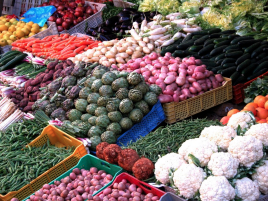Veggie Project Expands To Fight Childhood Obesity
By Nancy Deville | Jul 17, 2010

Sergio Escafuller hopes to change the way people think about fruit and veggies.
He’s landed his first job at The Veggie Project, which brings farmers’ markets to communities that tend to have the lowest concentrations of grocery stores and poor produce selection.
The project is open for the season, having expanded to six locations this summer.
At eight years old, Sergio knows enough about cabbage, zucchini, green beans and Southern peaches to get customers to leave with an armful of produce.
He uses his warm personality, handwritten signs and chants like ‘get your fruits and veggies to make you healthy” to get people to visit the produce stand.
“Eating fruits and veggies makes my body strong,” the St. Edward student said. “Even if they look disgusting, they are still actually good.”
Sergio is paid veggie bucks for time worked and uses them to buy produce like tomatoes, corn and peaches at the market.
“He is being reaffirmed about the value of vegetables,” said Dalmus Sanchez, Sergio’s mom. “He feels he has a job and is working for something he cares about.
“He wants to eat what he buys with more gusto than he would if I was feeding it to him.”
Vanderbilt launches program
The Veggie Project aims to address childhood obesity, family nutrition and food security issues. It recently opened for the season.
To educate children about nutrition, youngsters are recruited form the community to run and advertise the markets. They are part of the Youth Leader Board, a summer-long program in which they man the market as well as participate in weekly field trips and nutrition education classes.
The Veggie Project, which began as a dissertation project of a Vanderbilt University student in 2007, is a grant-funded community development and research program through the Monroe Carell Jr. Children’s Hospital at Vanderbilt.
Organizers load up their cars three times a week and set up shop in East Nashville, Woodbine, Wedgewood and North Nashville, bringing produce to some neighborhoods that otherwise don’t have access.
Last year the markets sold 6,864 pounds of food from 14 local farmers to over 1,200 customers.
“We hope the kids gain a deeper appreciation for the significance of healthy food and they start demanding more of it from their parents and community as well,” said Liz Aleman, healthy children’s program manager at Children’s Hospital.
All about veggie bucks
As an incentive to get people to patronize the market, adults can participate in the super shopper rewards program.
By signing up, they have an opportunity to earn veggie bucks for activities that promote learning more about preparing and consuming locally grown produce.
Participants can earn vouchers to the market for completing surveys, submitting healthy recipes or attending cooking classes.
Another benefit of The Veggie Project is that all food that comes into the community through the project stays in the community. Any leftover food is donated to local organizations and agencies such as homeless shelters and drug rehab centers.
“We are trying to increase access to fresh fruits and vegetables to change the environment,” said Liz Aleman, healthy children’s program manager at Children’s Hospital.
“We partner that with nutrition education and are giving out recipes and facts about the products we sell.”
Benefits for all, says doctor
Many children in neighborhoods that are considered food deserts often eat what is available and least expensive, mostly fast food or processed foods.
“Children are less familiar with vegetables than they used to be,” said Gregory Plemmons, director of the Pediatric Weight Management Clinic at the Monroe Carell Jr. Children’s Hospital at Vanderbilt.
“Fresh fruits and vegetables are affordable, but if not available, people won’t buy them. Everyone needs to eat more fruits and vegetables, not just overweight kids. If you increase your intake, you lower your risk of cancer and heart disease. It benefits all the kids in these neighborhoods.”
Jose Serrano says the best part of working at the market is getting a chance to buy produce.
“The fruit is so delicious,” the 10-year-old said. “Since I see the fruits and veggies every week, it makes me more hungry to eat them more, instead of fast food.”















